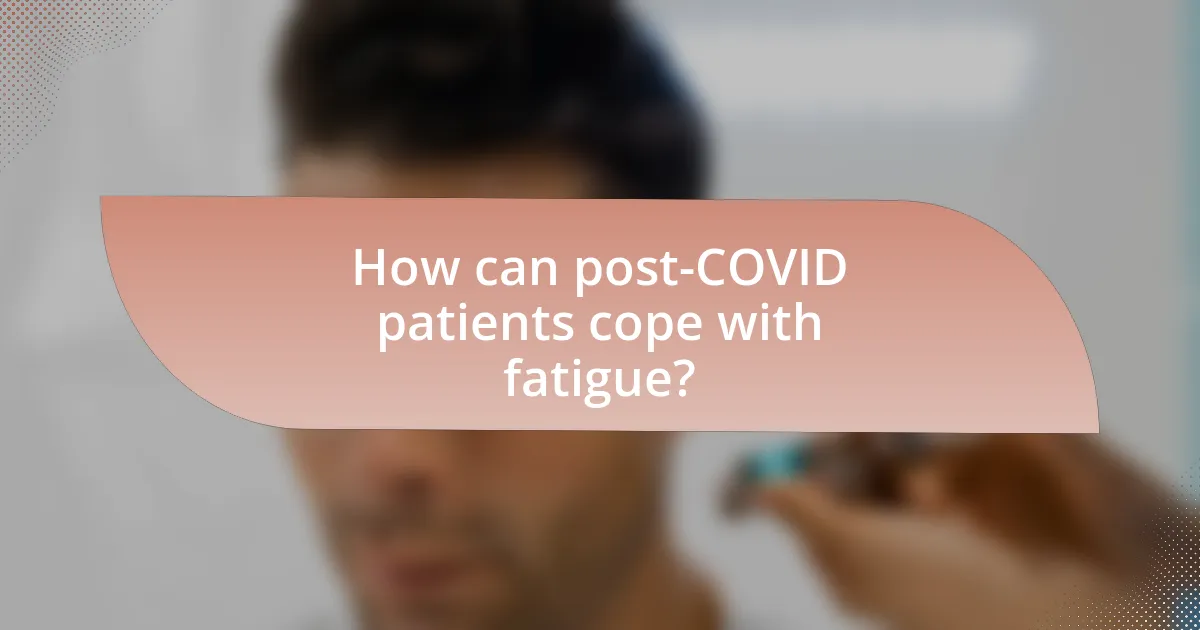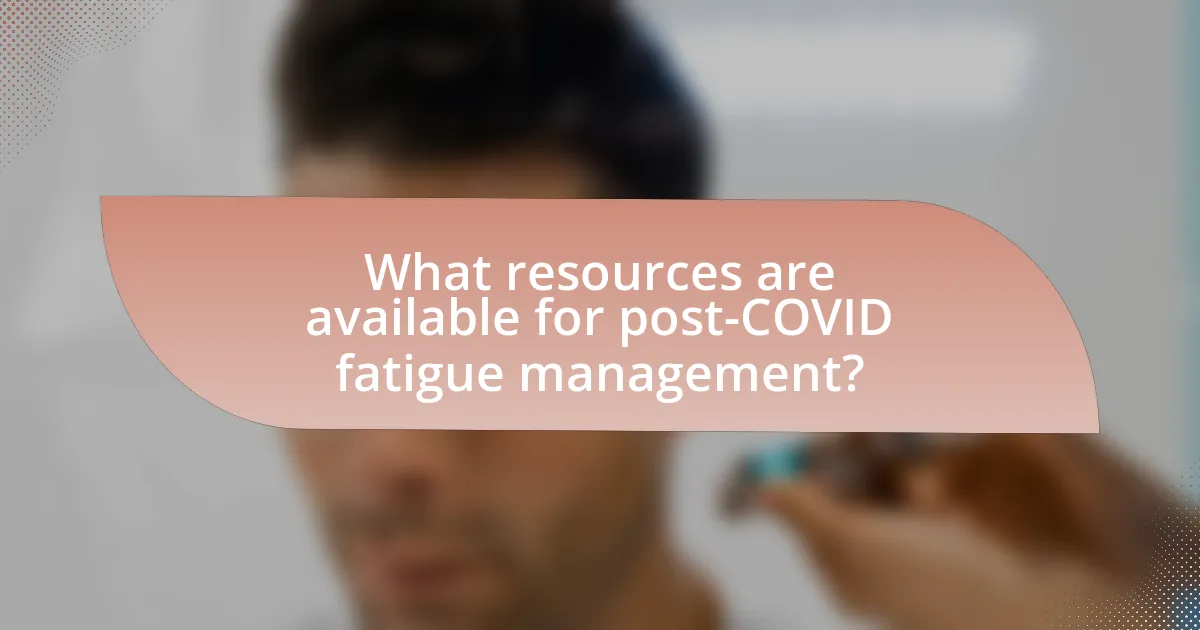Fatigue in post-COVID patients is a persistent condition marked by extreme tiredness that does not improve with rest, affecting approximately 30% to 40% of individuals recovering from COVID-19. This article provides a comprehensive overview of post-COVID fatigue, detailing its symptoms, potential causes, and the significant impact it has on daily life and productivity. It explores the differences between post-COVID fatigue and regular fatigue, the role of physical and mental health in exacerbating symptoms, and effective coping strategies, including lifestyle changes and support systems. Additionally, it highlights available resources and professional support options for managing fatigue in post-COVID patients.

What is Fatigue in Post-COVID Patients?
Fatigue in post-COVID patients is a persistent and debilitating condition characterized by extreme tiredness that does not improve with rest. This fatigue can significantly impact daily functioning and quality of life, often described as overwhelming and disproportionate to the level of activity. Research indicates that approximately 30% to 40% of individuals recovering from COVID-19 experience this form of fatigue, which may last for weeks or months after the initial infection. Studies, such as those published in the Journal of the American Medical Association, highlight that this fatigue can be accompanied by other symptoms, including cognitive difficulties and sleep disturbances, further complicating recovery efforts.
How does post-COVID fatigue differ from regular fatigue?
Post-COVID fatigue differs from regular fatigue primarily in its persistence and severity, often lasting for months and significantly impacting daily functioning. Unlike typical fatigue, which usually resolves with rest, post-COVID fatigue can be debilitating and is frequently accompanied by other symptoms such as cognitive impairment, sleep disturbances, and muscle weakness. Research published in the Journal of the American Medical Association indicates that approximately 30% of COVID-19 survivors experience prolonged fatigue, highlighting its distinct nature compared to conventional fatigue.
What are the symptoms of post-COVID fatigue?
Post-COVID fatigue is characterized by persistent tiredness that does not improve with rest. Common symptoms include extreme exhaustion, difficulty concentrating (often referred to as “brain fog”), sleep disturbances, muscle and joint pain, and a general sense of malaise. Research indicates that these symptoms can significantly impact daily functioning and quality of life for individuals recovering from COVID-19. Studies have shown that approximately 30% of COVID-19 survivors report experiencing fatigue lasting for months after the initial infection, highlighting the prevalence and seriousness of this condition.
Why do some patients experience prolonged fatigue after COVID-19?
Some patients experience prolonged fatigue after COVID-19 due to a combination of immune system dysregulation, persistent inflammation, and potential damage to various organs. Research indicates that the virus can trigger an overactive immune response, leading to chronic inflammation that may contribute to fatigue. A study published in the journal “Nature” found that many COVID-19 survivors report ongoing symptoms, including fatigue, months after recovery, suggesting that the virus can have long-lasting effects on the body. Additionally, factors such as psychological stress and deconditioning during illness can exacerbate feelings of fatigue in these patients.
What are the potential causes of fatigue in post-COVID patients?
Fatigue in post-COVID patients can be attributed to several potential causes, including persistent inflammation, immune system dysregulation, and psychological factors such as anxiety and depression. Research indicates that many post-COVID patients experience ongoing inflammation, which can lead to prolonged fatigue, as evidenced by studies showing elevated inflammatory markers in these individuals. Additionally, immune system dysregulation may result in an inability to effectively respond to stressors, further contributing to fatigue. Psychological factors, including anxiety and depression, are also prevalent in post-COVID patients, with studies revealing that these conditions can significantly impact energy levels and overall well-being.
How do physical health issues contribute to fatigue?
Physical health issues significantly contribute to fatigue by impairing the body’s ability to function optimally. Conditions such as chronic pain, cardiovascular diseases, and respiratory disorders can lead to decreased energy levels and increased exhaustion. For instance, chronic pain conditions can disrupt sleep patterns, leading to insufficient rest and heightened fatigue. Additionally, cardiovascular diseases can reduce blood flow and oxygen delivery to tissues, further exacerbating feelings of tiredness. Research indicates that individuals with chronic illnesses report higher fatigue levels, highlighting the direct correlation between physical health and energy levels.
What role does mental health play in post-COVID fatigue?
Mental health significantly influences post-COVID fatigue, as psychological factors such as anxiety, depression, and stress can exacerbate feelings of fatigue and hinder recovery. Research indicates that individuals experiencing mental health issues are more likely to report persistent fatigue after COVID-19, with studies showing that up to 30% of post-COVID patients experience symptoms of depression and anxiety, which are closely linked to fatigue levels. Furthermore, the interplay between mental health and physical health can create a cycle where fatigue leads to increased mental distress, further worsening fatigue.
What are the impacts of fatigue on daily life for post-COVID patients?
Fatigue significantly impacts the daily life of post-COVID patients by reducing their physical and cognitive functioning. This fatigue can lead to difficulties in performing everyday tasks, such as household chores, work responsibilities, and social interactions. Research indicates that approximately 30% to 50% of post-COVID patients experience persistent fatigue, which can last for months after recovery from the acute phase of the illness. This prolonged fatigue often results in decreased productivity, increased dependency on others, and a diminished quality of life, as patients struggle to engage in activities they previously enjoyed.
How does fatigue affect work and productivity?
Fatigue significantly reduces work performance and productivity by impairing cognitive functions and physical capabilities. Research indicates that fatigue can lead to decreased attention, slower reaction times, and impaired decision-making, which collectively hinder an individual’s ability to complete tasks efficiently. A study published in the Journal of Occupational Health Psychology found that employees experiencing high levels of fatigue reported a 30% decrease in productivity compared to their well-rested counterparts. Additionally, fatigue can increase the likelihood of errors and accidents, further impacting overall work output and safety.
What social and emotional challenges arise from fatigue?
Fatigue leads to significant social and emotional challenges, including increased feelings of isolation, anxiety, and depression. Individuals experiencing fatigue often struggle to engage in social activities, which can result in withdrawal from friends and family, exacerbating feelings of loneliness. Research indicates that chronic fatigue can impair emotional regulation, making it difficult for individuals to cope with stressors, leading to heightened anxiety levels. Furthermore, fatigue can diminish motivation and energy, contributing to depressive symptoms, as individuals may feel overwhelmed by daily tasks. These interconnected social and emotional challenges highlight the profound impact of fatigue on overall well-being, particularly in post-COVID patients who may already be facing additional health-related stressors.

How can post-COVID patients cope with fatigue?
Post-COVID patients can cope with fatigue by implementing a structured approach that includes gradual physical activity, proper nutrition, and adequate sleep. Engaging in light exercises, such as walking or stretching, can help improve energy levels and reduce fatigue over time. A balanced diet rich in vitamins and minerals supports overall health and energy, while prioritizing sleep hygiene—such as maintaining a consistent sleep schedule and creating a restful environment—can enhance restorative sleep. Research indicates that around 30% of post-COVID patients experience prolonged fatigue, highlighting the importance of these coping strategies in managing symptoms effectively.
What lifestyle changes can help manage fatigue?
To manage fatigue, individuals can implement several lifestyle changes, including establishing a consistent sleep schedule, engaging in regular physical activity, and maintaining a balanced diet. A consistent sleep schedule helps regulate the body’s internal clock, promoting better sleep quality, which is essential for energy restoration. Regular physical activity, even moderate exercise, has been shown to improve energy levels and reduce feelings of fatigue, as supported by research published in the Journal of Clinical Psychology, which found that exercise can significantly enhance overall well-being. Additionally, a balanced diet rich in whole foods, including fruits, vegetables, lean proteins, and whole grains, provides the necessary nutrients that support energy production and overall health.
How does nutrition influence energy levels?
Nutrition directly influences energy levels by providing the essential nutrients that fuel bodily functions and metabolic processes. A balanced diet rich in carbohydrates, proteins, fats, vitamins, and minerals ensures that the body has the necessary energy to perform daily activities. For instance, carbohydrates are the primary source of energy, while proteins are crucial for muscle repair and growth, and fats provide a concentrated energy source. Studies have shown that inadequate nutrition can lead to fatigue and decreased energy levels, as evidenced by research published in the Journal of Nutrition, which indicates that micronutrient deficiencies, such as iron and vitamin D, are linked to fatigue in various populations. Therefore, proper nutrition is vital for maintaining optimal energy levels and combating fatigue, especially in post-COVID patients who may experience prolonged tiredness.
What role does physical activity play in recovery?
Physical activity plays a crucial role in recovery by enhancing physical and mental well-being. Engaging in regular exercise can improve cardiovascular health, increase muscle strength, and boost energy levels, which are essential for individuals recovering from conditions like COVID-19. Research indicates that moderate physical activity can reduce fatigue and improve overall quality of life for post-COVID patients, as shown in a study published in the Journal of Rehabilitation Medicine, where authors found that patients who participated in structured exercise programs reported significant improvements in fatigue levels and physical function.
What are effective strategies for managing fatigue symptoms?
Effective strategies for managing fatigue symptoms include establishing a consistent sleep schedule, engaging in regular physical activity, and practicing stress management techniques. A consistent sleep schedule helps regulate the body’s internal clock, improving sleep quality and reducing daytime fatigue. Regular physical activity, even in moderate amounts, has been shown to enhance energy levels and reduce fatigue, as evidenced by a study published in the Journal of Clinical Psychology, which found that exercise significantly improved fatigue in individuals with chronic fatigue syndrome. Additionally, stress management techniques such as mindfulness meditation and deep breathing exercises can lower stress levels, which often exacerbate fatigue symptoms.
How can sleep hygiene improve fatigue management?
Sleep hygiene can significantly improve fatigue management by promoting restorative sleep patterns. Good sleep hygiene practices, such as maintaining a consistent sleep schedule, creating a comfortable sleep environment, and limiting screen time before bed, enhance sleep quality and duration. Research indicates that individuals who adhere to these practices experience reduced daytime fatigue and improved overall energy levels. For instance, a study published in the Journal of Clinical Sleep Medicine found that better sleep hygiene correlates with lower levels of fatigue and improved cognitive function in patients recovering from illnesses, including COVID-19. Thus, implementing effective sleep hygiene can be a crucial strategy for managing fatigue in post-COVID patients.
What relaxation techniques can help reduce fatigue?
Relaxation techniques that can help reduce fatigue include deep breathing exercises, progressive muscle relaxation, mindfulness meditation, and gentle yoga. Deep breathing exercises enhance oxygen flow and promote relaxation, which can alleviate feelings of fatigue. Progressive muscle relaxation involves tensing and then relaxing different muscle groups, helping to release physical tension and improve overall energy levels. Mindfulness meditation encourages present-moment awareness, reducing stress and mental fatigue. Gentle yoga combines physical movement with breath awareness, promoting relaxation and reducing fatigue. Research indicates that these techniques can significantly improve energy levels and overall well-being in individuals experiencing fatigue, particularly in post-COVID patients.
How can support systems aid in coping with fatigue?
Support systems can significantly aid in coping with fatigue by providing emotional, informational, and practical support. Emotional support from friends, family, or support groups can alleviate feelings of isolation and anxiety, which are common among individuals experiencing fatigue, especially post-COVID. Informational support, such as sharing coping strategies or resources, can empower individuals to manage their fatigue more effectively. Practical support, including assistance with daily tasks, can reduce the burden of fatigue and allow individuals to conserve energy for essential activities. Research indicates that social support is linked to better health outcomes, including improved mental health and reduced fatigue levels, highlighting the importance of these systems in recovery.
What types of professional support are available for post-COVID patients?
Post-COVID patients can access various types of professional support, including medical care, mental health services, rehabilitation programs, and support groups. Medical care typically involves follow-up appointments with healthcare providers to manage lingering symptoms and monitor recovery. Mental health services, such as therapy or counseling, address psychological impacts like anxiety or depression that may arise post-infection. Rehabilitation programs, including physical and occupational therapy, help patients regain strength and functionality. Support groups provide a platform for sharing experiences and coping strategies, fostering community among those facing similar challenges. These support types are essential for comprehensive recovery and improving quality of life for post-COVID patients.
How can family and friends provide effective support?
Family and friends can provide effective support by actively listening and validating the feelings of post-COVID patients. This emotional support helps individuals feel understood and less isolated, which is crucial for mental well-being during recovery. Research indicates that social support can significantly reduce feelings of fatigue and improve overall health outcomes for patients dealing with chronic conditions, including post-COVID fatigue. By offering practical assistance, such as helping with daily tasks or encouraging rest, family and friends can alleviate some of the burdens that contribute to fatigue, thereby enhancing the patient’s ability to cope with their condition.

What resources are available for post-COVID fatigue management?
Resources available for post-COVID fatigue management include rehabilitation programs, online support groups, and educational materials. Rehabilitation programs, such as those offered by the National Health Service (NHS) in the UK, provide tailored exercise and therapy plans to help patients regain strength and energy. Online support groups, like those found on platforms such as Facebook or dedicated health forums, allow individuals to share experiences and coping strategies. Educational materials from organizations like the Centers for Disease Control and Prevention (CDC) offer guidelines on managing fatigue and improving overall well-being. These resources are designed to assist individuals in navigating the challenges of post-COVID fatigue effectively.
What online resources can provide guidance and support?
Online resources that provide guidance and support for coping with fatigue in post-COVID patients include the Centers for Disease Control and Prevention (CDC), which offers information on post-COVID conditions, and the World Health Organization (WHO), which provides resources on managing long-term symptoms. Additionally, the National Institutes of Health (NIH) has a dedicated page for research and support related to post-viral fatigue. These organizations are reputable and provide evidence-based information, ensuring that patients receive accurate and helpful guidance.
How can support groups benefit post-COVID patients?
Support groups can significantly benefit post-COVID patients by providing emotional support, shared experiences, and practical coping strategies. These groups create a safe environment where individuals can express their feelings and challenges related to post-COVID symptoms, such as fatigue and anxiety. Research indicates that social support is crucial for recovery, as it can reduce feelings of isolation and improve mental health outcomes. For instance, a study published in the Journal of Psychosomatic Research found that individuals with chronic illnesses who participated in support groups reported lower levels of depression and anxiety compared to those who did not engage in such groups. This evidence underscores the importance of support networks in enhancing the overall well-being of post-COVID patients.
What literature is recommended for understanding post-COVID fatigue?
Recommended literature for understanding post-COVID fatigue includes “Long COVID: A Comprehensive Guide” by Dr. Michael Peluso and “Post-Acute Sequelae of SARS-CoV-2 Infection” published in the Journal of the American Medical Association. These works provide in-depth analysis and research findings on the symptoms, mechanisms, and management strategies associated with post-COVID fatigue. The JAMA article specifically discusses the prevalence and impact of long-term symptoms following COVID-19, offering valuable insights into the condition.
What are some practical tips for daily management of fatigue?
To manage daily fatigue effectively, individuals should prioritize regular sleep patterns, engage in light physical activity, and maintain a balanced diet. Establishing a consistent sleep schedule helps regulate the body’s internal clock, which is crucial for energy restoration. Light physical activity, such as walking or stretching, can enhance circulation and reduce feelings of tiredness. A balanced diet rich in whole foods, including fruits, vegetables, and lean proteins, provides essential nutrients that support energy levels. Research indicates that these strategies can significantly improve fatigue management, as evidenced by studies showing that sleep quality and nutrition directly impact energy levels and overall well-being.
How can patients prioritize tasks to conserve energy?
Patients can prioritize tasks to conserve energy by categorizing activities based on their importance and energy requirements. This method involves identifying essential tasks that must be completed and scheduling them during peak energy times, typically when patients feel most alert. Research indicates that using a priority matrix, where tasks are divided into categories such as urgent, important, and non-essential, can help patients focus on what truly matters while minimizing energy expenditure on less critical activities. Additionally, breaking larger tasks into smaller, manageable steps allows for rest periods in between, further conserving energy throughout the day.
What are some common troubleshooting strategies for fatigue management?
Common troubleshooting strategies for fatigue management include establishing a consistent sleep schedule, engaging in regular physical activity, and practicing stress-reduction techniques such as mindfulness or meditation. A consistent sleep schedule helps regulate the body’s internal clock, improving sleep quality and reducing daytime fatigue. Regular physical activity, even in moderate amounts, has been shown to enhance energy levels and overall well-being, as supported by research from the American College of Sports Medicine, which indicates that exercise can significantly reduce fatigue in various populations. Stress-reduction techniques, including mindfulness practices, have been proven to lower perceived fatigue levels by promoting relaxation and mental clarity, as evidenced by studies published in the Journal of Psychosomatic Research.


